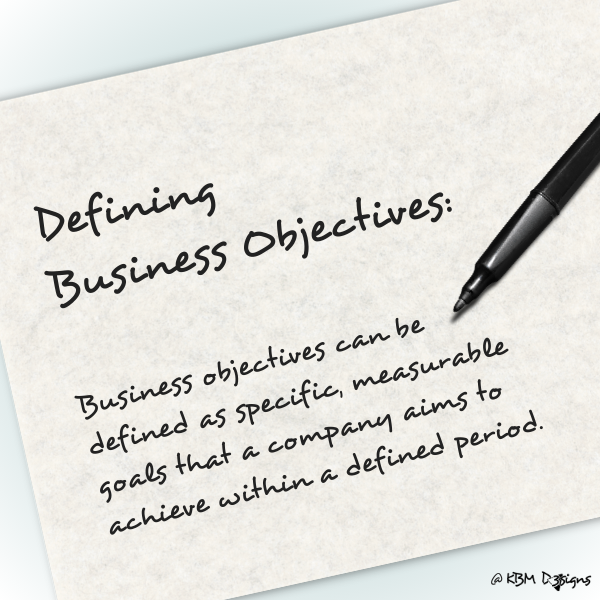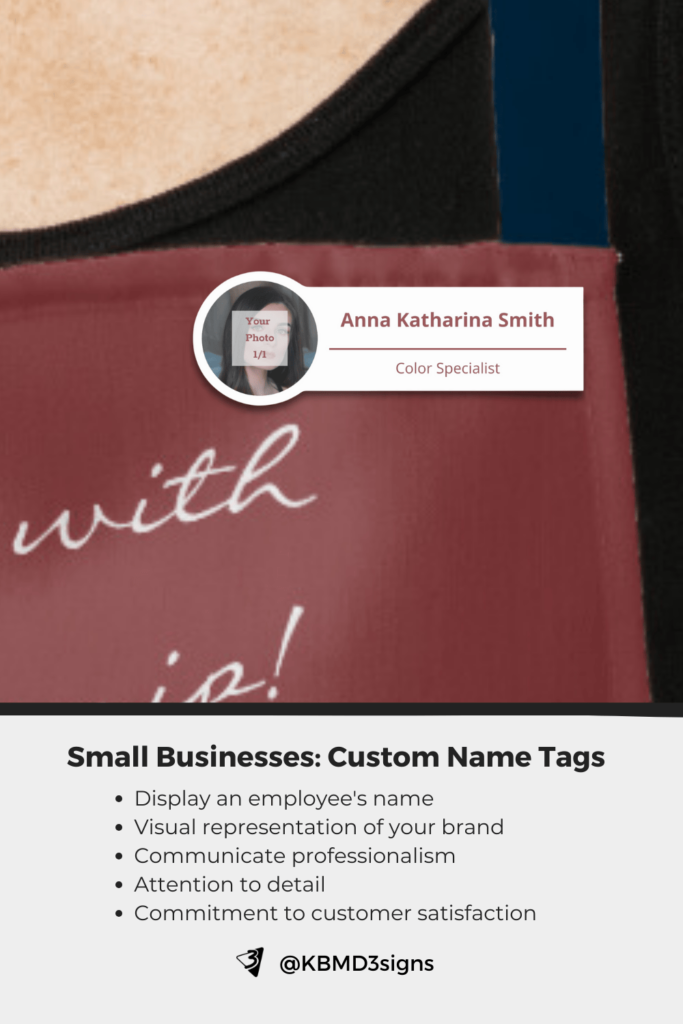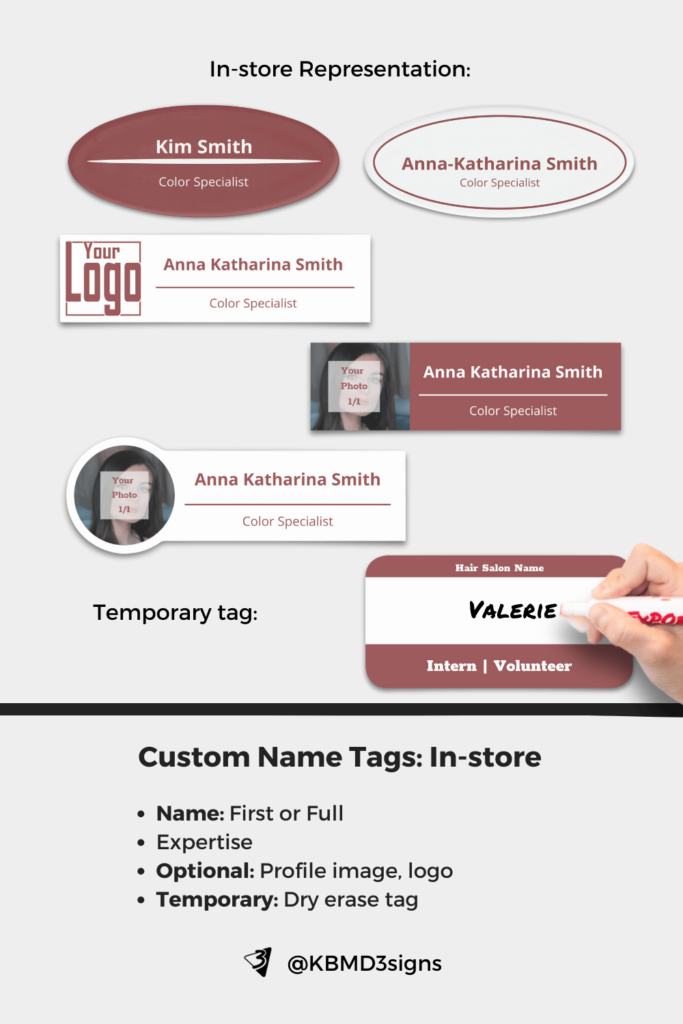In the bustling world of small businesses, every detail counts. From impeccable customer service to eye-catching branding, entrepreneurs understand the importance of leaving a lasting impression. One often overlooked yet incredibly powerful tool in achieving this is the humble name tag. However, in today’s competitive landscape, generic name tags simply won’t cut it. Enter custom name tags – a game-changer for small businesses looking to make a memorable mark.
Article Content:
1. Benefits of Custom Name Tags
Custom name tags offer a myriad of benefits beyond simply displaying an employee’s name. They serve as a visual representation of your brand, communicating professionalism, attention to detail, and a commitment to customer satisfaction. Whether you’re a boutique shop, a cozy café, or a tech startup, personalized name tags can elevate your business in numerous ways.
First and foremost, custom name tags allow you to showcase your brand identity. By incorporating your logo, color scheme, and unique design elements, you can ensure that every interaction with your staff reinforces your brand image. This cohesive branding not only fosters brand recognition but also instills a sense of trust and reliability in your customers.
Moreover, custom name tags provide a personal touch that fosters a stronger connection between your team members and customers. When customers see a friendly face accompanied by a personalized name tag, it humanizes the interaction and creates a more welcoming environment. This personalization can lead to increased customer satisfaction, loyalty, and ultimately, repeat business.
In addition to enhancing customer experience, custom name tags offer practical benefits for small businesses. They streamline operations by clearly identifying employees, making it easier for customers to seek assistance when needed. This efficiency is especially crucial in fast-paced environments where every second counts.
Furthermore, custom name tags can boost employee morale and pride in their work. Providing staff with personalized name tags demonstrates that their contributions are valued and recognized. It fosters a sense of ownership and belonging, which can lead to increased employee satisfaction and productivity.
When it comes to design, the possibilities are endless with custom name tags. Whether you opt for classic engraved tags, vibrant full-color badges, or eco-friendly materials, there’s a solution to suit every brand and budget. From elegant metal badges for upscale establishments to playful designs for family-owned businesses, custom name tags can be tailored to reflect your business’s personality and ethos.
Fortunately, obtaining custom name tags is easier than ever for small businesses. With the rise of online printing services and customizable name tag templates, entrepreneurs can create professional-looking name tags without breaking the bank. Many suppliers offer affordable options with quick turnaround times, allowing small businesses to order in small or larger quantities as needed.
In conclusion, custom name tags are a valuable investment for small businesses looking to stand out in a crowded marketplace. Not only do they reinforce brand identity and improve customer experience, but they also boost employee morale and streamline operations. By personalizing every interaction with custom name tags, small businesses can leave a lasting impression that keeps customers coming back for more. So why settle for generic when you can make a statement with custom name tags?
2. How to Customize Name Tag Designs by KBM D3signs?
At KBM D3signs, we offer a range of customizable name tag designs tailored to fit your business needs. Each template is part of a larger marketing package for small businesses and adheres to a cohesive brand style guide.
Here’s how you can personalize these name tags to reflect your brand and facilitate various professional interactions:
2-1. Customer Interaction Name Tags:
These name tags are designed to enhance customer experience by clearly displaying the employee’s name, area of expertise, and optionally, a profile photo. The use of brand colors and the company logo further reinforces your brand identity. By personalizing these tags, you can ensure every customer interaction is friendly, informative, and on-brand.
2-2. Networking Name Tags:
Networking-focused name tags go beyond the basics. In addition to the employee’s name, they include the company name, logo, and sometimes a QR code for easy scanning and instant connection or contact. These tags are perfect for trade shows, conferences, and professional events where making a lasting impression is crucial. Customize these tags with the necessary details to make networking effortless.
2-3. Temporary Support Name Tags:
For volunteers, interns, or other temporary staff, KBM D3signs offers dry-erase name tags. These tags allow you to write names manually while still maintaining a professional appearance with your company’s colors and design elements. This flexibility ensures that even short-term team members can seamlessly integrate into your brand environment.
Customization Tips:
- Insert Images: Upload employee profile photos or company logos to personalize each tag.
- Add Text: Customize the text fields with names, job titles, areas of expertise, and any additional information that may be relevant.
- Include Contact Details: For networking tags, consider adding a QR code or other contact methods to facilitate easy connections.
By customizing each name tag with these elements, you can create a cohesive and professional look across all your business interactions, whether in customer-facing roles, networking opportunities, or temporary support situations.
Explore the Zazzle marketplace or make a name tag from scratch.
Show off your personal style or post a review!
3. 3 Professional Tools that Communicate Name, Professional Status, and More
The three professional tools that communicate a name in a professional setting are Name Tags, Name Badges and Name Plates. Here we highlight their strategic use.
Strategic Professional Uses of Name Tags, Name Badges, and Name Plates:
3.1. Name Tags:
Event Networking: Name tags help in breaking the ice during conferences, seminars, and networking events by making introductions smoother.
Customer Interaction: In retail, hospitality, and healthcare, name tags enable customers to address staff members directly, fostering a more personalized experience.
Internal Identification: In large organizations, name tags help in identifying employees, departments, or roles, especially during interdepartmental meetings or training sessions.
3.2. Name Badges:
Security and Access Control: Name badges often include additional information like job title, department, or access level, which enhances security and access management within an organization.
Professional Image: Custom-designed name badges can reinforce a company’s brand identity, providing a professional and cohesive look across the organization.
Employee Recognition: Badges can also display awards or certifications, recognizing employees’ achievements and skills.
3.3. Name Plates:
Office Personalization: Name plates on desks or office doors personalize spaces, making employees feel more valued and helping visitors identify the correct person.
Brand Representation: They can reflect the company’s brand, often including logos, colors, and titles, contributing to a consistent and professional environment.
Hierarchical Clarity: They provide clear identification of roles, especially in hierarchical settings like law firms, government offices, or academic institutions.
Advantage of One Over the Other:
- Name Tags are more flexible and suitable for temporary events or settings where quick identification is needed.
- Name Badges provide a more formal, secure, and brand-oriented presentation, often worn daily by employees.
- Name Plates offer a permanent, professional representation in an office environment, reinforcing stability and authority.
4. What information to add?
What information to put on a name tags used in: store setting, trade show, workshop, or professional networking meeting?
- Store Setting:
Name: First name or full name of the staff member.
Job Title: Position or role within the store (e.g., Sales Associate, Manager).
Store Logo: To reinforce branding and promote recognition. - Trade Shows/Events/Workshops:
Name: First name or full name of the attendee or participant.
Company/Organization: Name of the attendee’s employer or organization.
Job Title/Role: Position or role within the company or organization.
Event Logo/Name: Logo or name of the event for branding purposes. - Professional Networking Meetings:
Name: First name or full name of the attendee.
Company/Organization: Name of the attendee’s employer or organization.
Job Title/Role: Position or role within the company or organization.
Contact Information: Optional, but sometimes email address or phone number for networking purposes.
Additional Situations to Wear Professional Name Tags:
- Conferences: Attendees wear name tags to facilitate networking and identification of speakers, sponsors, and organizers.
- Corporate Meetings: Name tags help identify employees, facilitate introductions, and promote a professional atmosphere.
- Educational Events: Name tags can assist in identifying students, faculty, and staff at academic conferences, seminars, or campus events.
- Volunteer Events: Name tags help distinguish volunteers from attendees and promote team cohesion.
- Medical/Healthcare Settings: Healthcare professionals wear name tags to identify themselves to patients, visitors, and colleagues, enhancing communication and trust.
In all these situations, wearing professional name tags fosters communication, facilitates networking, promotes branding, and enhances the overall experience for attendees, participants, and staff.
5. Design Aspects to Consider
When designing professional name tags, several design aspects should be considered to ensure they are both functional and visually appealing. Here are key factors to keep in mind:
5-1. Font Choice:
Readability: Choose a clear, legible font, especially for names and titles. Sans-serif fonts like Arial, Helvetica, or Calibri are popular for their readability.
Consistency: Use the same font throughout the name tag to maintain a professional appearance. Consider using bold or larger text for the name, with smaller font sizes for additional details.
Brand Alignment: Select a font that aligns with your brand identity. For instance, a playful, creative font might suit a design company, while a more traditional font might be appropriate for a law firm.
5-2. Shape and Size:
Standard Shapes: Rectangular name tags are the most common, but rounded corners can soften the look. Circular or oval name tags can add uniqueness but should still be easy to read.
Size Considerations: Ensure the name tag is large enough to accommodate all necessary information without being cluttered. Common sizes range from 1” x 3” to 2” x 3.5”.
5-3. Logo or Profile Image:
Logo Placement: A logo should be prominent but not overpower the name. Placing it in the top left or centered above the name is common.
Profile Image: Including a photo of the individual is beneficial in networking or event settings where face recognition is important. Place the image on the left, with the name and other details to the right.
Shape of Image or Logo: A round logo or profile image can contrast nicely with rectangular name tags, while square images are versatile and clean.
5-4. Role/Job Title:
Positioning: Typically placed directly beneath the name, the job title should be clearly visible but secondary to the name in terms of size and emphasis.
Hierarchical Design: Use size or weight variations to create a visual hierarchy, emphasizing the most important information (name) and then role or title.
5-5. Contact Information:
Inclusion: For networking events, adding an email address, phone number, or website URL can be valuable. This should be subtle and less prominent than the name and title.
QR Codes: Consider including a small QR code that links to a digital business card or LinkedIn profile, saving space and making it easy for others to connect.
5-6. Color Scheme:
Brand Colors: Incorporate your brand colors to ensure consistency with other marketing materials.
Contrast: Ensure there is enough contrast between the text and background for easy readability. For example, white text on a dark background or dark text on a light background works well.
5-7. Material and Finish:
Material Choice: Consider the material of the name tag—plastic, metal, or eco-friendly options. The material should reflect the brand’s quality and ethos.
Finish: A glossy finish offers a polished look, while matte can appear more modern. Choose according to your brand style.
Additional Elements:
Borders: Adding a border around the name tag can help define the space and focus attention.
Icons or Symbols: Small icons can be used to indicate social media handles, contact methods, or special roles (e.g., speaker, organizer).
In summary, the design of a name tag should balance aesthetics with functionality, reflecting your brand while ensuring the information is easily accessible and clear.
-

6 Winter Marketing Ideas for Small Businesses
Read the post …: 6 Winter Marketing Ideas for Small Businesses -

6 Offline Summer Marketing Ideas for Small Businesses
Read the post …: 6 Offline Summer Marketing Ideas for Small Businesses -

What is Seasonal Marketing? A Guide for Small Business Offline Success
Read the post …: What is Seasonal Marketing? A Guide for Small Business Offline Success
6. Frequently Asked Questions About: Custom Name Tags
Custom name tags offer numerous benefits for your business. They serve as a visual representation of your brand, fostering brand recognition and trust among customers. Additionally, personalized name tags create a more welcoming environment, enhance customer experience, streamline operations, and boost employee morale.
The customization options for name tags are virtually endless. You can incorporate your logo, brand colors, and unique design elements to align with your brand identity. Choose from a variety of materials, shapes, sizes, and printing techniques to create a name tag that suits your business’s style and budget.
Custom name tags make it easier for customers to identify and engage with your staff, leading to a more personalized and efficient experience. When customers see a friendly face accompanied by a personalized name tag, it creates a sense of trust, professionalism, and approachability, ultimately enhancing their overall satisfaction.
Yes, custom name tags can positively impact employee morale. Providing staff with personalized name tags demonstrates that their contributions are valued and recognized. It fosters a sense of ownership, pride, and belonging, which can lead to increased job satisfaction and productivity.
The cost of custom name tags can vary depending on factors such as materials, design complexity, and quantity ordered. However, with the rise of online printing services and customizable templates, obtaining affordable custom name tags is easier than ever for businesses of all sizes. Many suppliers offer options to suit different budgets and provide discounts for bulk orders.
Ordering custom name tags is simple and convenient. Many online printing services offer customizable templates and easy-to-use design tools, allowing you to create professional-looking name tags from the comfort of your home or office. Simply choose your desired customization options, upload your logo or design, and place your order. Many suppliers offer quick turnaround times and shipping options to ensure prompt delivery.
-

What Is A Brand Partnership? – A Small Business Perspective
Read the post …: What Is A Brand Partnership? – A Small Business Perspective -

What Are Business Objectives?” Perspective Of A Small Business
Read the post …: What Are Business Objectives?” Perspective Of A Small Business -

What Is A Focus Group Market Research? – SMB Perspective
Read the post …: What Is A Focus Group Market Research? – SMB Perspective





